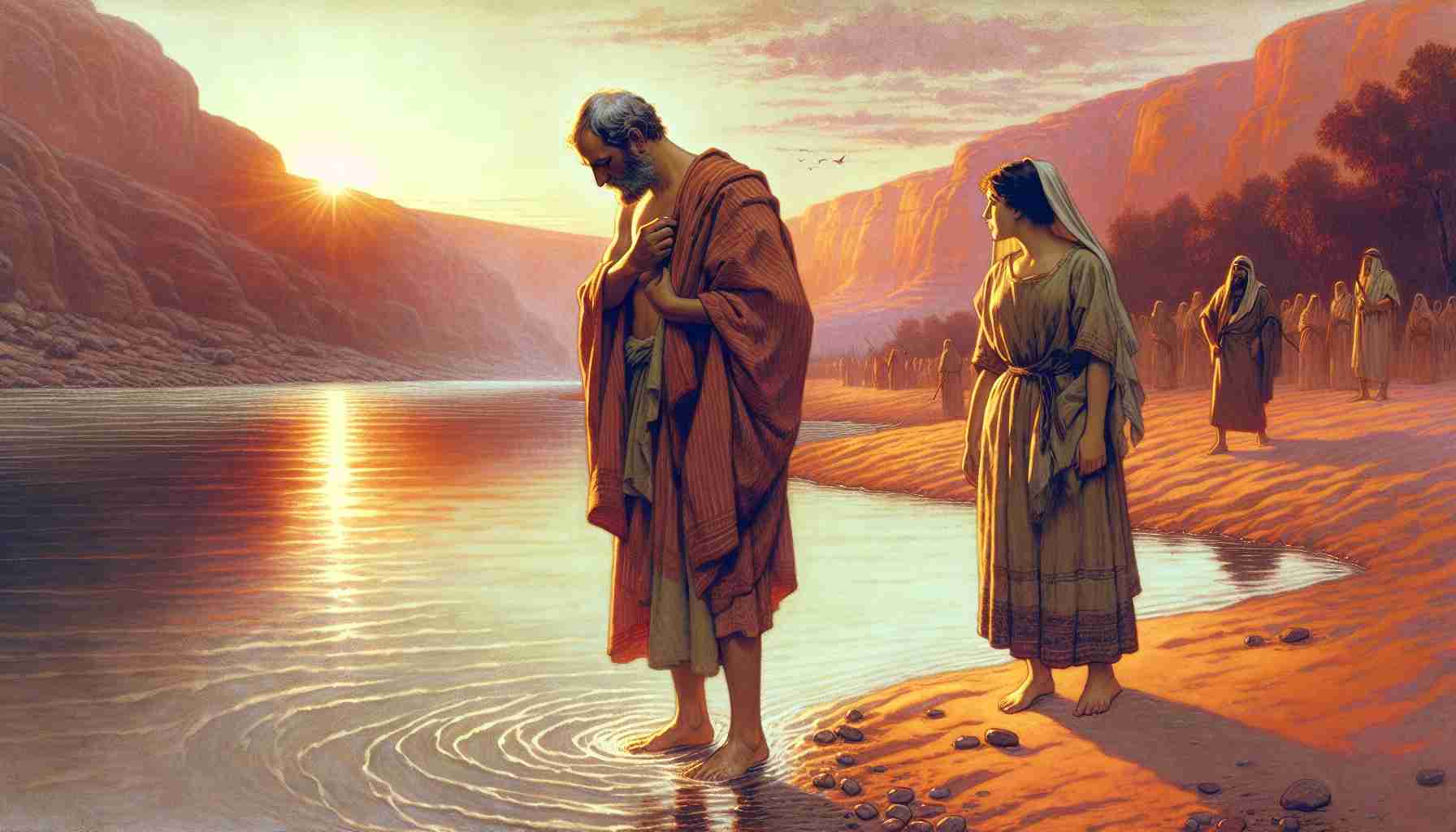

My hands shook as I gripped the reins of the horse. The desert wind scratched at my face, but all I could feel was the weight of my shame. I was Naaman’s servant. Yes, that Naaman—the commander of Aram’s army, victorious in battles, feared across the lands. And yet, on this journey, it was not his strength that stood out. It was something else. Something harder to earn than medals of war.
Naaman had leprosy—tzara’at—leprosy, a skin disease that no doctor could fix. His armor covered the sores, but I had seen him wince when weather turned cold. He didn’t want anyone to know, but a young girl—an Israelite servant we’d taken in a raid—had told my master that a prophet in her homeland could heal him. The prophet’s name was Elisha—the prophet who succeeded Eliyahu (Elijah), a revered figure in Israel.
And that’s why I was here, riding next to a general now humbled by illness and hope.
When we reached Elisha’s home, Naaman expected drums, prayers, maybe even magic. But Elisha didn’t come out. Not even to greet him! He sent a message through a servant, telling Naaman, “Go wash seven times in the Yarden—the Jordan River—and your flesh will be healed.”
Naaman’s face burned with anger.
“Wash in their river?” he hissed. “Aren’t the rivers in Damascus better than all the waters of Israel?” He stormed off so fast the dust stung my eyes.
I followed, heart pounding. I wasn’t brave. I was a servant. But something inside whispered that I had to speak.
“My lord,” I said, gently, “if the prophet had told you to do something great—some mighty battle to win your healing—you would have done it. So why not this small thing, just wash and be clean?”
He stopped. His lips tightened. I thought he might strike me. But instead… he turned. He didn’t speak. He just nodded.
We rode silently to the Yarden. Not a grand river like back home—muddy, slow. Naaman removed his armor, each clang like a sigh. I looked away from his skin, raw and pale.
He stepped into the water. Once. Twice. Three times. Still the same. Four. Five. Six.
And then—seventh.
When he rose, we both gasped. His skin shone like that of a newborn. Smooth. Clean. Whole.
He stood silently in the river, staring at his hands as though they weren’t his own.
I had never seen a warrior weep before.
Later, he returned to Elisha—not to thank him, but to thank the God of Israel. Not just for healing his body, but for healing something deeper. His pride. His heart.
That day, I learned something no battle could teach: sometimes, the greatest strength is learning to bow.
And sometimes, the smallest river carries the biggest miracle.
My hands shook as I gripped the reins of the horse. The desert wind scratched at my face, but all I could feel was the weight of my shame. I was Naaman’s servant. Yes, that Naaman—the commander of Aram’s army, victorious in battles, feared across the lands. And yet, on this journey, it was not his strength that stood out. It was something else. Something harder to earn than medals of war.
Naaman had leprosy—tzara’at—leprosy, a skin disease that no doctor could fix. His armor covered the sores, but I had seen him wince when weather turned cold. He didn’t want anyone to know, but a young girl—an Israelite servant we’d taken in a raid—had told my master that a prophet in her homeland could heal him. The prophet’s name was Elisha—the prophet who succeeded Eliyahu (Elijah), a revered figure in Israel.
And that’s why I was here, riding next to a general now humbled by illness and hope.
When we reached Elisha’s home, Naaman expected drums, prayers, maybe even magic. But Elisha didn’t come out. Not even to greet him! He sent a message through a servant, telling Naaman, “Go wash seven times in the Yarden—the Jordan River—and your flesh will be healed.”
Naaman’s face burned with anger.
“Wash in their river?” he hissed. “Aren’t the rivers in Damascus better than all the waters of Israel?” He stormed off so fast the dust stung my eyes.
I followed, heart pounding. I wasn’t brave. I was a servant. But something inside whispered that I had to speak.
“My lord,” I said, gently, “if the prophet had told you to do something great—some mighty battle to win your healing—you would have done it. So why not this small thing, just wash and be clean?”
He stopped. His lips tightened. I thought he might strike me. But instead… he turned. He didn’t speak. He just nodded.
We rode silently to the Yarden. Not a grand river like back home—muddy, slow. Naaman removed his armor, each clang like a sigh. I looked away from his skin, raw and pale.
He stepped into the water. Once. Twice. Three times. Still the same. Four. Five. Six.
And then—seventh.
When he rose, we both gasped. His skin shone like that of a newborn. Smooth. Clean. Whole.
He stood silently in the river, staring at his hands as though they weren’t his own.
I had never seen a warrior weep before.
Later, he returned to Elisha—not to thank him, but to thank the God of Israel. Not just for healing his body, but for healing something deeper. His pride. His heart.
That day, I learned something no battle could teach: sometimes, the greatest strength is learning to bow.
And sometimes, the smallest river carries the biggest miracle.